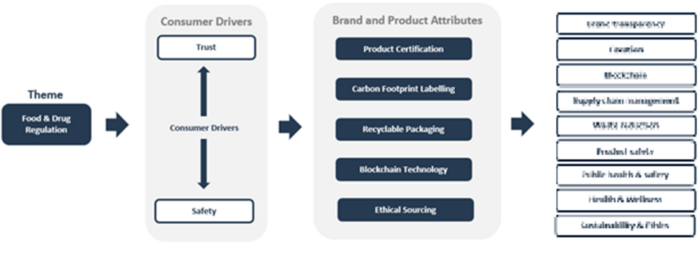New Food Marketing Regulations – Thematic Research
Powered by ![]()
All the vital news, analysis, and commentary curated by our industry experts.
Food marketing, at its core, is about communicating information with shoppers. This is primarily done via product claims, labeling, and advertising – both online (in digital and broadcast marketing materials) and in print (magazines, billboards, posters, leaflets, and newspapers).
Food regulation has been a hot topic in recent years due to the proliferation of cannabidiol (CBD)-infused food innovations, countries cracking down on unhealthy foods that are high in fat, salt, and sugar (HFSS) being marketed to children, and meat alternative technology growing more advanced. These three sectors will be explored more deeply in this report, as they represent three types of regulatory gray zones: a previously controlled substance being incorporated into food, food types that are increasingly being viewed as potentially harmful to children, and novel foods that push the boundaries of what was thought possible. The phenomenon of digitalization has led to companies leveraging social media to attract more consumers.
The new food marketing regulations thematic intelligence report provides insights into the key trends impacting the theme and industry and value chain analysis. The report also lists leading private and public companies associated with the theme and their competitive position.
New Food Marketing Regulations: Industry Analysis
More consumers are switching to a plant-based diet or reducing their meat intake and the meat substitutes market is witnessing growing demand as a result. This high interest in plant-based meat alternatives is creating high expectations and attracting substantial investment.
Companies need to follow the required legislation to avoid misleading the consumer. The use of ingredients that replace the meat element with a plant protein must be clarified on the label, be approved, and comply with the novel food regulations. Currently, many companies are producing microbial fermentation using bacteria, yeasts, and fungi instead of animals.
To sustain the brand’s success in the long term, the brand has to describe the ingredients and standards required. In this way, the brand provides the right label claim and meets consumers’ expectations. Therefore, companies must state on the packaging that the product is derived from plant-based sources to avoid consumers misunderstanding a product.
The report also discusses the impact of new food marketing regulations on the savory snacks and confectionery sectors. Also, the new food marketing regulations market research report offers insights into:
- Mergers and acquisitions
- Company filings trends
- Hiring trends
- Social media trends
- Timeline
For more industry analysis and insights into new food marketing regulations, download a free report sample
Food Marketing Regulation Theme: Key Trends
The main trends shaping the food marketing regulations theme are classified into three categories: technology trends, macroeconomic trends, and industry trends.
- Technology Trends – The key technology trends impacting the food marketing regulations are social media, disinformation, artificial intelligence, consumer engagement, omnichannel marketing, and new tech, too fast.
- Macroeconomic Trends – The report analyses several macroeconomic trends impacting the food marketing regulations, including disease management and emergency exceptions.
- Industry Trends – The report highlights the key industry trends such as ecolabels, nutritional data in online spaces, language barriers, and retailer compliance.
For more insights on key trends impacting the food marketing regulations theme, download a free report sample
New Food Marketing Regulations: Value Chain Analysis
Food and drug regulation relies on two fundamental consumer drivers: trust and safety. To gain consumer trust and achieve product safety, the value chain is centered on five brand and product attributes namely product certification, carbon footprint labeling, recyclable packaging, blockchain technology, and ethical sourcing.
Product Certification: Product certification is quite useful in marketing as it brings credibility to the company. Currently, there are several certifications that a food company can achieve to provide a guarantee that its products meet consumer demands. Organizations and labels such as the Rainforest Alliance, USDA-Organic, UK Soil Association, non-GMO, vegan, vegetarian, and gluten-free certifications increase the probability of a consumer deciding to purchase the product. These certifications are associated with sustainable and ethical values that many consumers are now expecting to find on the product packaging.
Carbon Footprint Labeling: FMCG companies are including the carbon footprint on product packaging, as more regulations are pushing for transparency while providing information about a product’s environmental impact, especially if the company has set a goal to reduce its carbon footprint in the future
The Marketing Regulations Value Chains
For more insights on marketing regulation value chain, download a free report sample
Leading Private Companies Associated with Food Marketing Regulations Theme
Some of the private companies making their mark within the marketing regulations theme are:
- Cargill Inc
- Mercadona SA
- Groupe Lactalis SA
- Falabela SA
- Syngenta AG
Leading Public Companies Associated with Food Marketing Regulations Theme
Some of the public companies making their mark within the new food marketing regulations theme:
- Nestlé SA
- BASF SE
- Archer Daniels Midland Co
- PepsiCo Inc
- JBS SA
To know more about leading companies associated with food marketing regulation theme and their competitive position, download a free report sample
New Food Marketing Regulations Market Report Overview
| Report Pages | 44 |
| Key Trends | Technology, Macroeconomic, Industry |
| Value Chain | Product Certification, Carbon Footprint Labeling, Recyclable Packaging, Blockchain Technology, and Ethical Sourcing |
| Leading Private Companies Associated with the Theme | Cargill Inc, Mercadona SA, Groupe Lactalis SA, Falabela SA, and Syngenta AG |
| Leading Public Companies Associated with the Theme | Nestlé SA, BASF SE, Archer Daniels Midland Co, PepsiCo Inc, and JBS SA |
Reasons to Buy
- Understand multiple themes and company responses to tap into what is really impacting the industry.
- Gain a broader appreciation of the fast-moving consumer goods industry by gaining insights from both within and outside of your sector.
- Access valuable strategic take-outs to help direct future decision-making and inform new product development.
Table of Contents
Frequently asked questions
-
What are the key technology trends impacting the food marketing regulation theme?
The key technology trends impacting the food marketing regulation theme are social media, disinformation, artificial intelligence, consumer engagement, omnichannel marketing, and new tech, too fast.
-
What are the key macroeconomic trends impacting the food marketing regulation theme?
The key macroeconomic trends impacting the food marketing regulation theme are disease management and emergency exceptions.
-
What are the key industry trends impacting the food marketing regulation theme?
The key industry trends impacting the food marketing regulation theme are ecolabels, nutritional data in online spaces, language barriers, and retailer compliance.
-
What are the key attributes of food marketing regulation value chain?
The key attributes of food marketing regulation value chain are product certification, carbon footprint labeling, recyclable packaging, blockchain technology, and ethical sourcing.
-
Which are the leading private companies associated with the food marketing regulation theme?
Some of the leading private companies making their mark within the food marketing regulations theme are Cargill Inc, Mercadona SA, Groupe Lactalis SA, Falabela SA, and Syngenta AG.
-
Which are the leading public companies associated with the food marketing regulation theme?
Some of the leading public companies making their mark within the food marketing regulation theme are Nestlé SA, BASF SE, Archer Daniels Midland Co, PepsiCo Inc, and JBS SA.
Get in touch to find out about multi-purchase discounts
reportstore@globaldata.com
Tel +44 20 7947 2745
Every customer’s requirement is unique. With over 220,000 construction projects tracked, we can create a tailored dataset for you based on the types of projects you are looking for. Please get in touch with your specific requirements and we can send you a quote.












